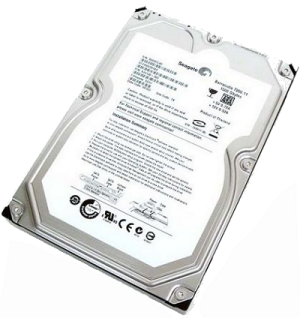Study: A Look At Hard Drive Reliability In Russia
Storelab, a Russian player in data recovery, recently released a long-term study comparing hard drives from a number of different vendors. The controversial report offers interesting data and provides a snapshot of HDD reliability and defect reasons.
Typical Failures And Data Losses
Seagate Bitten by the "CC Fly"
Seagate's results stem mainly from the 500 GB to 1.5 TB Barracuda 7200.11-series. These products comprise over 65% of all failed Seagate drives received by Storelab. Most drives failed within the first one and a half years, and thus were still covered by the warranty. In comparison, the older Seagate 7200.10-series is much sturdier and only accounted for 35% of failed Seagate drives. The most common failure cause for the 7200.11 was faulty firmware, which would issue the error code "000000CC." This led the Storelab engineers to coin the term "CC fly" (tsetse fly). Faulty drives would slow down and subsequently die after rebooting.
There were other errors as well, and not just from Seagate. The most common was wedging of the drive's axle. This happens occasionally to all hard drive brands. High-capacity hard drives use three or more magnetic disks, or platters. The additional platters increase the load on the axle, and the resultant physical stress leads to motor failures. A drop of only 20 cm can be enough to wedge the axle, which will first manifest through increasing hard drive noise and vibration. Seagate uses a new technology in the 7200.12 and later drives to counter this issue. We will have to wait for more long-term studies in order to find out if matters have been truly remedied.
Western Digital in the Background
As for Western Digital's failures, 59% of the company's examined hard drives had a capacity of up to 500 GB, and their average lifespan was 3.5 years. The remaining 41% exceeded 500 GB. Due to their construction and additional platters, these larger models are less durable, exhibiting an average lifespan of only 1.5 years. Storelab notes that read/write head failure is somewhat characteristic for WD drives. Failures primarily occur as a result of physical impact or overheating (WD heads can be sensitive at temperatures above 45°C).
Western Digital's construction makes drives particularly vulnerable to shocks and pressure. Unlike other manufacturers, WD does not secure the hard drive axle with a separate screw to the drive cover. Because of this, pressure exerted on the housing or cover can shift the axle, resulting in it changing its angle, and then damaging the platters. The axle's attachment to the cover is another reason. If the cover is moved, the engine may be blocked. Except for this vulnerability, though, WD hard drives are mechanically and electronically reliable.
Wedged Axles from Toshiba/Fujitsu and Samsung
Get Tom's Hardware's best news and in-depth reviews, straight to your inbox.
Only 2.5" notebook hard drives from Toshiba/Fujitsu were evaluated in this study, and the average lifespan of these drives was two years. Their most common problem was wedged axles due to defective fluid bearings, usually from aging. The axles on the Toshiba/Fujitsu drives are attached to the cover, but the cover is very thin and subject to deformations. Over time, lubrication liquid in the bearings can evaporate. This gradually increases the friction in the socket, producing splinters that eventually eat away at the axle. Wedging of the axle is one of the worst things that can happen to a hard drive, and data recovery may not always be possible.
Another common reason for failures in these notebook hard drives is the damage caused by the read/write heads falling on the moving platters. Normally these heads float on a thin layer of air over the spinning platters, but if something happens and the two come in direct contact, the platters are usually so badly scratched that the hard drive is unusable. You might hear a faint hum, the drive will be detected in the BIOS, but it may not work anymore. Data is almost always lost if this happens. Mechanical damage from these head crashes is the most common cause of failure in Samsung hard drives.
Current page: Typical Failures And Data Losses
Prev Page The Durability Standard Next Page Results And Conclusions
Igor Wallossek wrote a wide variety of hardware articles for Tom's Hardware, with a strong focus on technical analysis and in-depth reviews. His contributions have spanned a broad spectrum of PC components, including GPUs, CPUs, workstations, and PC builds. His insightful articles provide readers with detailed knowledge to make informed decisions in the ever-evolving tech landscape
-
cmcghee358 Why post this study if, at every opportunity, you tell us that the data is so limited we aren't to use it as guidance on the quality of the listed drives?Reply
Seems a waste of time. -
mitch074 @cmcghee358: because if they didn't put it at least once per page, polemics could be started by any website linking to one page without it said "THG says Seagate drives are crap!".Reply
Which is true, but only according to a limited, but still relevant (and one of the few available) study.
But, it correlates pretty well to what I experienced: the only failed Hitachi drives I got (and I got a bunch of them) were due to:
- manufacturing fault (and RMA worked well and fast) creating faulty sectors,
- old age (10 years) creating faulty sectors.
Never once, in the two dozen Hitachi (and IBM) drives I had to manage, was a failure related to hardware fault - even dropping a (not running) 2001 drive from one meter height on solid concrete failed to damage it.
I tried Maxtor, Toshiba, and WD drives, and most of these eventually developed unrecoverable hardware faults leading to massive data losses; Hitachi drives caused, at worst, a few files to be lost due to irrecoverable sectors (many times, I got SMART warnings before the data became impossible to rebuild).
I got some Samsung drives recently; they're cheap, and they added shock resistance capabilities in the 2.5" versions, I'll see if they do better than the Hitachi ones (I do backups on Hitachi drives still). If this report is any indication, Samsung notebook drives in RAID 1 array for a desktop machine should allow for reliable operation - the one I have carried around for 2 years in my fanny pack seems sturdy enough, too. -
jj463rd Oddly enough I had to get rid of some old relics (I.B.M. XT's) from the mid 1980's last year.All 5 of them had hard drives which still worked and the machines were still fully functional.Sad I would have liked to have kept them but there was too much clutter in my house.Reply -
jsowoc I'm not sure if my comment is valid, but because Seagate has a lot of market share, its drives are considered "reliable" by many. If I paid a premium for the drive, it's because I have (had?) valuable data on it, and am willing to pay for data recovery.Reply
Could this be part of the reason why Seagate has more than its fair share of drives sent in? -
obrut I have replaced all my Seagate drives with WDs during the last year. My personal study for the last 20 years show that throughout this period only the WD drives show long enough lifespan and reliability. Recently (last 2-3 years) Seagate took quality out of the equation. Currently they are only interested in market share and not the fair name their own brand.Reply
Again, this is personal study - for example I have used only one Hitachi drive during this period, so I can't make statistics on the base of one. -
liquidsnake718 Well I live in the Philippines and im not happy to say that almost 2 years ago I bought a WD Passport and it died on me after 3 months. WD or the retailor replaced it for me via the local distributor. However I lost all of my data that was backed up because prior to that my significantly older Seagate serial IDE 80gb with THAT very same data died on me!Reply
Yeah WD gave me a slightly upgraded HD with 40 more GB but all that info and files that were lost was irreplacable. The problem, was a faulty pin, or the reader that looks like a raptors nail! The device would just click and click and my HDD wouldnt read. -
I'm not sure why but I don't like Seagate too :) Most of my hard drives are Hitachi and I've got 2 failures - one after a power surge and another which was some bad sectors, but the drive was 60GB and it was around 3 years old. I have one Seagate drive and it works fine, I've been using it for around 3 years now on a storage server.Reply
I know a lot of people who had problems with that particular "CC Fly", maybe that is why I don't like Seagate. Nowadays I'm turning to WD, I really want to see how are they doing.
Btw I have 3-4 40GB Maxtors that are still very much alive and working for about 9 years now :) -
dragonsqrrl I remember reading about some problems with the Seagate 7200.11 series, along with a lot of bad ratings on Newegg.Reply -
Azriel4444 The Seagate 7200.11 series was horrible. I avoid them no matter how cheap they are on sale. 7200.12 are way more dependable.Reply
